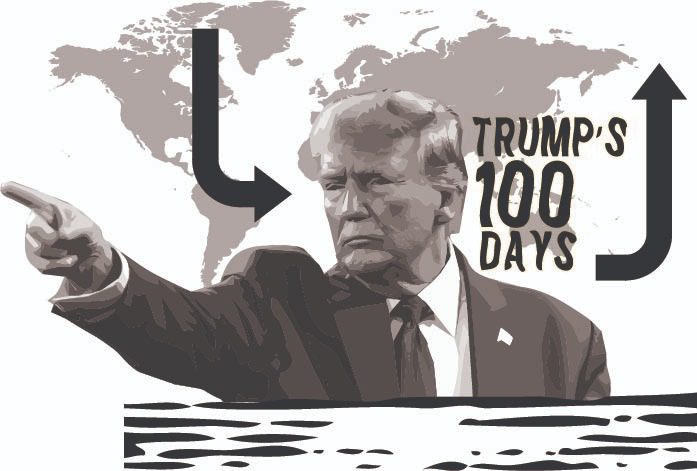Emdadul Hoque Badal
By any measure, 100 days is a short time. But when you’re the President of the United States — a nation with unparalleled influence over global affairs — 100 days can shape the future, both at home and far beyond your borders. In his return to the White House, Donald Trump has wasted no time showing that his vision for America is one of inward retreat and calculated disruption. And the world is watching.
From dismantling key diplomatic initiatives to slashing funding for international institutions, Trump’s actions in these first three months of his second term suggest a clear pattern: America is no longer trying to lead the world — it’s trying to dominate or ignore it. For allies and adversaries alike, the message is loud and clear: the old rules no longer apply.
This isn’t just a matter of partisan politics. It’s a reshaping of America’s identity on the global stage. Trump’s brand of ‘America First’ is not merely a slogan; it is a strategy rooted in skepticism of multilateralism, disdain for traditional diplomacy, and an embrace of transactional politics that often treats allies with the same suspicion as rivals.
Donald Trump’s tariff-driven trade war with China marked a turning point in global economic diplomacy. By unilaterally imposing steep tariffs on hundreds of billions of dollars’ worth of Chinese goods, the Trump administration abandoned multilateral mechanisms in favor of blunt economic pressure. While framed as a move to protect American industries, the tariffs disrupted global supply chains and introduced volatility that rippled far beyond the U.S. and China. For countries like Bangladesh, the episode underscored the dangers of overdependence on global markets vulnerable to abrupt policy shifts in major economies.
Consider the chilling effect of Trump’s recent decision to walk away from funding the United Nations Relief and Works Agency (UNRWA), which supports Palestinian refugees. Or his threats to pull out of NATO exercises if European nations don’t meet his financial benchmarks. Or his frosty, transactional call with the new president of South Korea, during which he reportedly demanded that Seoul pay more for hosting U.S. troops. In each case, Trump seems to treat foreign relations less as partnerships and more like business negotiations — with little concern for shared history, common values, or long-term consequences.
Even closer to home, his first 100 days have been marked by a disturbing retreat from democratic norms. His attacks on the press have intensified, his administration has made moves to undercut judicial independence, and his thinly veiled threats toward state officials who certified 2024 election results are reminders that Trump is still trying to settle old scores. But the consequences of these domestic shifts ripple outward: a president who disrespects democratic institutions at home can’t credibly defend them abroad.
Internationally, the contrast between the America of today and the America of even a decade ago is stark. Once seen as a reliable force for stability — albeit not without its flaws — the U.S. under Trump is increasingly viewed as unpredictable, self-interested, and unreliable. In Brussels, Berlin, Ottawa, and Tokyo, longtime allies are recalibrating their defense strategies and foreign policy priorities, hedging against the possibility that America may simply not show up in a crisis.
Some argue that this is simply realism — that the world no longer needs a global policeman. But leadership isn’t just about policing; it’s about trust, influence, and example. And in ceding that ground, Trump has created a vacuum that others are already filling. China, for example, is stepping up as a lender and power broker across the Global South. Russia is asserting itself in Eastern Europe and the Middle East. Even middle powers like Turkey, India, and Saudi Arabia are growing bolder, sensing a lack of coordination from Washington.
It means more uncertainty. It means fewer coordinated responses to global health threats. It means slower progress on climate change. It means a world in which autocratic leaders feel emboldened, because they no longer fear pressure from Washington. For many living under repressive governments, the moral leadership once symbolized by the U.S. flag is starting to fade.
Of course, 100 days does not define a presidency. There is still time for course correction, for diplomacy, for leadership. But if these early months are any indication, the Trump administration is steering America not just in a different direction — but toward a different identity altogether.
The question we should all be asking now isn’t just what Trump will do next. It’s what kind of country the United States wants to be in a changing world — and whether, after turning its back, it will be welcome when it tries to lead again.
The writer is a journalist


